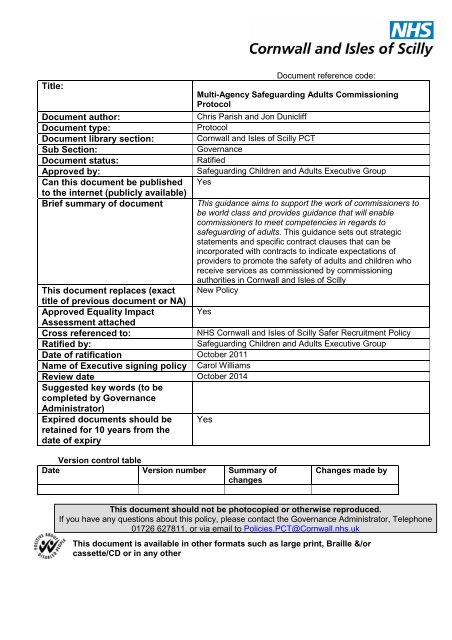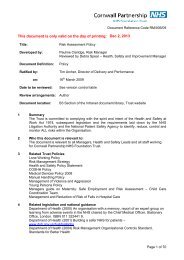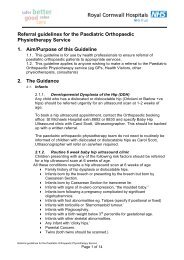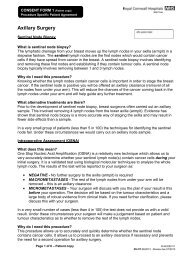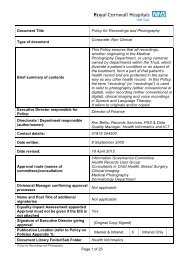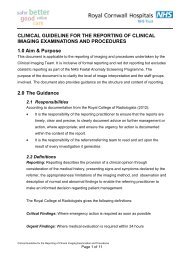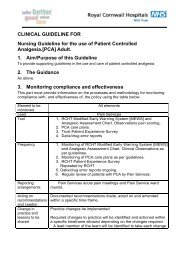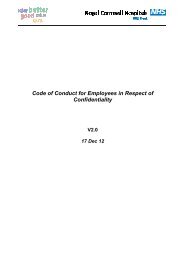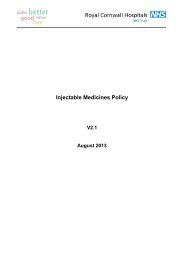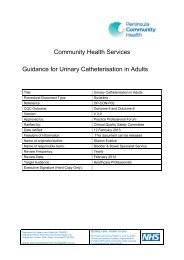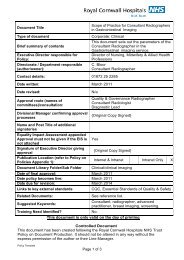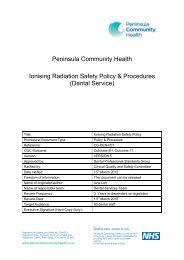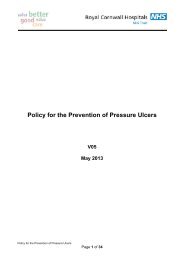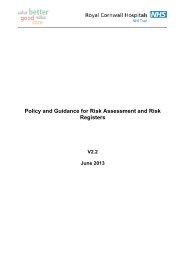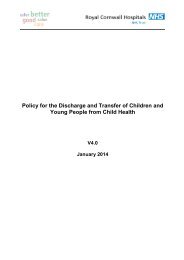Multi Agency Safeguarding Adults Commissioning Protocol
Multi Agency Safeguarding Adults Commissioning Protocol
Multi Agency Safeguarding Adults Commissioning Protocol
Create successful ePaper yourself
Turn your PDF publications into a flip-book with our unique Google optimized e-Paper software.
Cornwall and Isles of Scilly <strong>Multi</strong>-agency <strong>Safeguarding</strong> <strong>Adults</strong> <strong>Commissioning</strong> <strong>Protocol</strong> October 2011Page 2ConsultationList the individuals (use titles only)/groups consulted.This must include the Counter Fraud Local SecurityManagement Specialist<strong>Multi</strong>agency <strong>Safeguarding</strong> <strong>Adults</strong> UnitCluster Director of Nursing<strong>Safeguarding</strong> Children and <strong>Adults</strong> Executive GroupCommissioners across all statutory and voluntaryorganisations<strong>Safeguarding</strong> <strong>Adults</strong> BoardIndicate which of theconsultees in the left handcolumn have respondedYesYesYesYesYesConsultation commentsreceivedNoneCommentsAcceptedCommentsrejectedReason forrejectionDisseminate to:NHS Cornwall and Isles of Scilly <strong>Commissioning</strong> Staff and Senior managementwithin provider organisations (Helen Newson, Chris Rashleigh, Ellen Wilkinson)Dissemination methods:Electronically Via Tracey ColesAim:To ensure that all NHS Cornwall and Isles of Scilly <strong>Commissioning</strong> contractscontain clauses regarding safeguarding adults and include methods for audit ofcompliancePurpose:To provide NHS Cornwall and Isles of Scilly <strong>Commissioning</strong> staff with an outline ofwhat is required to be included in all contracts with provider services regardingsafeguarding adults.Objectives: List the objectives to be achieved. They must be Specific, Measurable,Realistic and Timebound (SMART)All <strong>Commissioning</strong> contracts will include clauses regarding safe recruitment,reporting safeguarding adults alerts made, training status of staff and complianceauditing proceduresResponsibilities:All NHS Cornwall and Isles of Scilly <strong>Commissioning</strong> staffDefinitions/Glossary:None2
Cornwall and Isles of Scilly <strong>Multi</strong>-agency <strong>Safeguarding</strong> <strong>Adults</strong> <strong>Commissioning</strong> <strong>Protocol</strong> October 2011Introduction:This guidance aims to support the work of commissioners to be world class andprovides guidance that will enable commissioners to meet competencies in regards tosafeguarding of adults. This guidance sets out strategic statements and specificcontract clauses that can be incorporated with contracts to indicate expectations ofproviders to promote the safety of adults and children who receive services ascommissioned by commissioning authorities in Cornwall and Isles of ScillyTraining: Has a training need been identified? If so what is it and how will itbe addressedNoKey Performance Indicators: List how you, as the policy author, will measurethe success of achievement against the objectivesAudit of contractsMonitoring: To which Board/sub-committee/committee will the results of theoutcome of the assessment against the key performance indicators bereported<strong>Safeguarding</strong> Children and <strong>Adults</strong> Executive GroupEquality Impact Assessment: Attach a completed EIA prior to submitting forapproval/ratification3
Cornwall and Isles of Scilly <strong>Multi</strong>-agency <strong>Safeguarding</strong> <strong>Adults</strong> <strong>Commissioning</strong> <strong>Protocol</strong> October 2011Cornwall and Isles of Scilly<strong>Multi</strong>-agency <strong>Safeguarding</strong> <strong>Adults</strong><strong>Commissioning</strong> <strong>Protocol</strong>October 20114
Cornwall and Isles of Scilly <strong>Multi</strong>-agency <strong>Safeguarding</strong> <strong>Adults</strong> <strong>Commissioning</strong> <strong>Protocol</strong> October 2011AcknowledgementsWith grateful thanks to Southwark Health and Social Care.5
Cornwall and Isles of Scilly <strong>Multi</strong>-agency <strong>Safeguarding</strong> <strong>Adults</strong> <strong>Commissioning</strong> <strong>Protocol</strong> October 2011Contents1. Introduction Page 42. <strong>Safeguarding</strong> <strong>Adults</strong> national framework Page 5Good practice standards:3. <strong>Commissioning</strong> Criteria Page 74. Strategy Statements Page 115. Contract Terms Page 116. Contract Monitoring Page 157. <strong>Commissioning</strong> Processes Page 178. <strong>Commissioning</strong> Workforce Page 179. References Page 19Appendix One <strong>Safeguarding</strong> Page 20adults competencies framework6
Cornwall and Isles of Scilly <strong>Multi</strong>-agency <strong>Safeguarding</strong> <strong>Adults</strong> <strong>Commissioning</strong> <strong>Protocol</strong> October 20111. IntroductionThis guidance aims to support the work of commissioners to be world classand provides guidance that will enable commissioners to meetcompetencies in regards to safeguarding of adultsThis guidance has been prepared to support commissioners working withinCornwall and Isles of Scilly to implement the Care Quality Commission(CQC) and Association of Directors of Social Services (ADASS) andDepartment of Health (DoH) guidance regarding the commissioning ofservices and safeguarding adults.This guidance sets out strategic statements and specific contract clausesthat can be incorporated with contracts to indicate expectations of providersto promote the safety of adults and children who receive services ascommissioned by commissioning authorities in Cornwall and Isles of Scilly.Commissioners in Cornwall and Isles of Scilly have a duty to safeguard andpromote the welfare of children and vulnerable adults. In addition PrimaryCare Trusts have a duty to improve the health of the whole population whichincludes safeguarding and promoting the welfare of vulnerable adults.BackgroundIn 2000 the Department of Health and the Home Office published thedocument ‘No Secrets: guidance on developing and implementing multiagencypolicy and procedures to protect vulnerable adults from abuse’. In2005, the document ‘<strong>Safeguarding</strong> <strong>Adults</strong>’ was published by the Associationof Directors of Social Services to give a national framework of standards forgood practice and outcomes in adult protection work. The publication’s aimhas been to serve as a toolkit for organisations providing health and careservices for adults to develop evidence-based good practice framework toensure the safety of vulnerable adults. The Care Quality Commissionindependently regulates health and social care in England setting cleartargets and outcome measures.Reports and reviews such as Six Lives published in March 2009 by theHealth Service and Local Government Ombudsman have informed thispolicy.The Government White Paper Liberating the NHS (2010) clearly indicatesthat ‘patients must be at the heart of the NHS’ and that ‘patient safety is putabove all else’. The DOH guidance for NHS Commissioners & ProviderBoards on <strong>Safeguarding</strong> <strong>Adults</strong> (2011) states that we have ‘some way to goin achieving the vision set in Liberating the NHS if the common themesidentified in the No Secrets Review and from investigations such as the MidStaffordshire NHS Foundation Trust, are to be believed. Recurrent themesidentified are that patient’s voices are not being heard, patients are notbeing empowered to make choices about their care, neglect and abuse arenot always being recognised, there is a lack of transparency andsafeguarding adults is often seen as the responsibility of others.7
Cornwall and Isles of Scilly <strong>Multi</strong>-agency <strong>Safeguarding</strong> <strong>Adults</strong> <strong>Commissioning</strong> <strong>Protocol</strong> October 2011Cornwall and Isles of Scilly <strong>Safeguarding</strong> <strong>Adults</strong> Board’s multi agency policyoutlines the values and objectives of safeguarding adults work. This policy isbased on individual human rights, and underpins all decision making. Thepolicy has also emphasised a move away from merely responding to abuseonce it had occurred to one that aims to prevent it.The multi agency policy stipulates the role and responsibilities of servicecommissioners in supporting the safeguarding adults process.Commissioners need to work proactively with service providers to promoteand operate the <strong>Safeguarding</strong> <strong>Adults</strong> Policy and Procedures within Providerorganisations and to maintain the safety and well being of adults andchildren with respect to services provided under contract by commissionersin Cornwall and Isles of Scilly.Purpose of <strong>Protocol</strong>We linked the best practice standards from both ADASS, CQC, DoH, SHAand themes/descriptors taken from inspection reports to develop thecontract clauses contained in this guidance.Commissioners have a choice as to where to insert the clauses withinexisting contracts (as contract schedules) or within the body of newcontracts or as a temporary measure as a codicil to existing contracts.Commissioners may need to make slight amendments to adapt contractclauses to their commissioning field.Cornwall Council Legal Team, have reviewed and agreed the contractualclauses contained within this protocol2. The ADASS <strong>Safeguarding</strong> <strong>Adults</strong> national framework comprises elevengood practice standards:Standard 1Standard 2Standard 3Standard 4Standard 5Each local authority has established a multi-agency partnershipto lead ‘<strong>Safeguarding</strong> <strong>Adults</strong>’ work.Accountability for and ownership of ‘<strong>Safeguarding</strong> <strong>Adults</strong>’ workis recognised by each partner organisation’s executive body.The ‘<strong>Safeguarding</strong> <strong>Adults</strong>’ policy includes a clear statement ofevery person’s right to live a life free from abuse and neglect,and this message is actively promoted to the public by theLocal Strategic Partnership, the ‘<strong>Safeguarding</strong> <strong>Adults</strong>’partnership, and its member organisations.Each partner agency has a clear, well-publicised policy of Zero-Tolerance of abuse within the organisation.The ‘<strong>Safeguarding</strong> <strong>Adults</strong>’ partnership oversees a multi-agencyworkforce development/training sub-group. The partnership hasa workforce development/training strategy and ensures that it isappropriately resourced8
Cornwall and Isles of Scilly <strong>Multi</strong>-agency <strong>Safeguarding</strong> <strong>Adults</strong> <strong>Commissioning</strong> <strong>Protocol</strong> October 2011Standard 6All citizens can access information about how to gain safetyfrom abuse and violence, including information about the local‘<strong>Safeguarding</strong> <strong>Adults</strong>’ procedures.Standard 7Standard 8Standard 9There is a local multi-agency ‘<strong>Safeguarding</strong> <strong>Adults</strong>’ policy andprocedure describing the framework for responding to all adults"who is or may be eligible for community care services" andwho may be at risk of abuse or neglect.Each partner agency has a set of internal guidelines, consistentwith the local multi-agency ‘<strong>Safeguarding</strong> <strong>Adults</strong>’ policy andprocedures, which set out the responsibilities of all workers tooperate within it.The multi-agency ‘<strong>Safeguarding</strong> <strong>Adults</strong>’ procedures detail thefollowing stages: Alert, Referral, Decision, <strong>Safeguarding</strong>assessment strategy, <strong>Safeguarding</strong> assessment, <strong>Safeguarding</strong>plan, Review, Recording and Monitoring.Standard 10 The safeguarding procedures are accessible to all adultscovered by the policy.Standard 11 The partnership explicitly includes service users as keypartners in all aspects of the work. This includes buildingservice-user participation into its: membership; monitoring,development and implementation of its work; training strategy;and planning and implementation of their individualsafeguarding assessment and plans.9
Cornwall and Isles of Scilly <strong>Multi</strong>-agency <strong>Safeguarding</strong> <strong>Adults</strong> <strong>Commissioning</strong> <strong>Protocol</strong> October 20113. <strong>Commissioning</strong> Criteria<strong>Commissioning</strong> Criteria taken from ADASS, DoH and CQC guidance and Themesand Recommendations from Inspection ReportsCriteria<strong>Commissioning</strong> Strategy1) Ensure there is a joint commissioning strategy for each commissioning area thatincorporates safeguarding adults policy.2) Ensure service users and carers are represented and involved: a) on strategicplanning groups b) when design services c) when evaluating services3) Ensure that there has been a detailed audit to provide assurance of thesafeguarding arrangements made by providers in relation to the delivery of services4) Ensure that services are commissioned and decommissioned to driveimprovements and promote the delivery of personalised careContracts5) Ensure that relevant safeguarding policies are signposted within the contract a)safeguarding multi agency policy & procedures, b) Safer recruitment standards c)safeguarding training (e.g. who requires and has received the appropriate level oftraining) d) Provide service users with guidance and opportunities to providefeedback on the care received either to the provider or an independentorganisation. e) Quality assurance processes (e.g. Serious untoward incidents)6) Ensure that there are clear arrangements for contract monitoring betweencommissioner and provider where quality, service user outcomes and value formoney are discussed and improvements agreedProviders standards7) AccountabilityThere should be;a lead senior manager who is informed about, and who takesresponsibility for the actions of their staff in safeguarding and promotingthe welfare of vulnerable adults.a clear line of accountability through the organisation which includes allstaff.8) PolicyEach organisation should have a comprehensive safeguarding policy which is inline with national and SAB guidance and which takes account of guidance from anyrelevant professional body. Inherent within any policy should be that adults withoutexception have the right to protection from abuse regardless of gender, ethnicity,disability, sexuality or beliefs. This policy should be easily accessible by staff at alllevels.10
Cornwall and Isles of Scilly <strong>Multi</strong>-agency <strong>Safeguarding</strong> <strong>Adults</strong> <strong>Commissioning</strong> <strong>Protocol</strong> October 20119) Staff Training and Continued Professional DevelopmentStaff should be trained and competent to be alert to potential indicators of abuseand neglect in adults, know how to act on their concerns and fulfil theirresponsibilities in line with SAB guidance and Deprivation of Liberties Guidance.To achieve this standard all organisations should; have a training policy covering all staff detailing, required skills andcompetencies commensurate with their role and responsibilities. a training strategy should be in place for this policy to be achieved. Thisshould be in accordance with SAB guidance on safeguarding adultstraining hold a database detailing the uptake of all staff training so employerscan be alerted to unmet training needs and training provision can beplanned. have in place a training programme that is appropriate to the role of staffand ensure that staff are released to attend the relevant training enable and ensure provision of staff to have update training every 3years as a minimum ensure staff are aware of any new guidance or legislation and anyrecommendations from Local and National Serious Case Reviews andInternal Management Reviews.10) Safe Recruitment and Vetting ProceduresThere should be a policy in place for safe recruitment practices for staff.Where a criminal record review is mandatory this must be undertaken routinely andupdated as required.Employers must comply with the revised vetting and barring scheme. It has beencreated under the <strong>Safeguarding</strong> Vulnerable Group Act 200617 and replaces thecurrent disqualification orders. The Independent Safety Authority (ISA) decides whois unsuitable to work or volunteer with vulnerable groups, drawing information fromvarious agencies, government departments and the Criminal Records Bureau.11) Managing Allegations Against StaffOrganisations should;have in place procedures for responding when allegations are madeagainst people who work with <strong>Adults</strong> and comply with SAB policies andprocedures, and guidance.In addition NHS Trusts should: have a named senior officer who has overall responsibility for;i) ensuring the organisation operates procedures for dealing withallegationsii) resolves any inter-agency issuesiii) liaises with the SABiv) seek advice from the <strong>Safeguarding</strong> <strong>Adults</strong> Unit11
Cornwall and Isles of Scilly <strong>Multi</strong>-agency <strong>Safeguarding</strong> <strong>Adults</strong> <strong>Commissioning</strong> <strong>Protocol</strong> October 201112) Inter-agency WorkingStaff should work together with other agencies in accordance with the SAB policiesand procedures. All services should have in place, policies and procedures that arein accordance with national guidance including No Secrets.13) Information SharingOrganisations should have in place or have adopted local policies and proceduresfor sharing of information where there are concerns for the welfare of an adult.Senior Managers should promote good practice in information sharing according tothe published national guidance; Information Sharing; Guidance for Practitionersand Managers. DCSF 200814) SupervisionOrganisations providing services should have a policy and arrangements in placeto provide staff with supervision and support to; enable them to manage stresses within their work promote good practice and quality assure the services they provide ensure that staff use effective systems to record their work. follow local multi-agency policy and procedures.The level of supervision provided should be in accordance with the degree andnature of contact that staff have with vulnerable adults and families.In addition for NHS TrustsA confidential service should be provided for staff for emotional support whendealing with cases of adult abuse. Staff should be aware how to contact their ownNHS Trusts, Named Professional(s) for safeguarding or, if working outside an NHSTrust, the PCT’s Designated <strong>Safeguarding</strong> <strong>Adults</strong> Professionals.15) Vulnerable <strong>Adults</strong>Staff should be alert to the increased likelihood of harm being suffered byvulnerable adults and those living in special circumstances, whose needs may notbe recognised by staff employed in providing services. Staff should be fully awareof their organisation’s Whistle Blowing Procedure.16) Response to Incidents and ComplaintsThere should be a policy with regard to incidents and complaints relating to anyaspect of safeguarding adults. This should include the need to inform the SeniorManagement Lead for <strong>Safeguarding</strong> within the organisation.In addition for NHS TrustsThresholds for raising a Serious Untoward Incident (SUI) should be clear and ifrequired advice should be sought from Designated and Named Professionals for<strong>Safeguarding</strong>.Within the NHS Trust the Named Nurse, Doctor or Professional for that Trustshould be informed about any incident or complaint relating to safeguarding.12
Cornwall and Isles of Scilly <strong>Multi</strong>-agency <strong>Safeguarding</strong> <strong>Adults</strong> <strong>Commissioning</strong> <strong>Protocol</strong> October 2011If the organisation is not an NHS Trust the PCT Designated Nurse for <strong>Safeguarding</strong><strong>Adults</strong> should be informed.17) Serious Case Reviews (SCRs)Cornwall & isles of Scilly SAB has guidance for conducting serious casereviews and the serious case review individual management templates that need tobe used for any provider commissioned when contributing to a SCR or IMR.Cornwall and Isles of Scilly SAB also has guidance on conducting learning fromexperience meetings.Staff who have been involved in cases which are subject to a SCR or learning fromexperience meeting should be supported and be provided with time to write reportsand attend interviews. Organisations have a responsibility to act on their relevantrecommendations from SCRs and learning from experience meetings.In addition for NHS TrustsNamed <strong>Safeguarding</strong> Professionals within NHS Trusts should be provided withadditional time in which to conduct Individual Management Reviews (IMR) whichform part of <strong>Multi</strong>-<strong>Agency</strong> Serious Case Reviews (SCRs).18) Special Requirements for Specific NHS OrganisationsAll NHS Trusts should designate a Named Professional for <strong>Safeguarding</strong> <strong>Adults</strong>who provide advice and expertise for colleagues and other agencies and promotesgood professional practice within the Trust.Information held by the commissioner19) Ensure that the commissioner receives any feedback on the quality of service byoperational staff (i.e. complaints, safeguarding issues, Critical incidents, qualityalert, etc)20) Ensure the audit of reports relating to the risk of harm to identify trends / root causeanalysis21) Ensure that there is a quality assurance system in place with feedback to agencies22) Ensure that there is a system in place for service user and carer to feedback tocommissioners on the care received from Providers.23) Ensure commissioners receive information from operational, provider staff andvolunteers about current use of services, including unmet need and these areshared at regular, routine meetings24) Ensure Commissioners collect /receive data about assessed needs for crimeprevention measures and victim support services25) Ensure that there is system in place for safeguarding service users on DirectPayments/Individual Budgets13
Cornwall and Isles of Scilly <strong>Multi</strong>-agency <strong>Safeguarding</strong> <strong>Adults</strong> <strong>Commissioning</strong> <strong>Protocol</strong> October 2011<strong>Commissioning</strong> Workforce26) Ensure all commissioning staff have undertaken safeguarding training and thereare clear processes in place to support good practice4. Strategy Statements<strong>Safeguarding</strong> adults and children is core to our business, andcommissioning organisations in Cornwall and Isles of Scilly have a statutoryduty to eliminate all forms of unlawful discrimination, promote good relationsbetween different groups, protect human rights and provide dignity andrespect in service provision. To achieve this, common understanding andcommitment about integrating equality and human rights across allstakeholders (e.g commissioners, service providers and service users) iscrucial to ensure dignity and respect outcomes.5. Contract TermsListed below are key documents that require signposting to the serviceprovider contract. It is recommended that you attach electronic web link tothe referenced document and/or attaching it as separate schedule.• Cornwall and Isles of Scilly <strong>Safeguarding</strong> Adult <strong>Multi</strong> <strong>Agency</strong> Policy &Procedures• Safer Recruitment• Council’s or PCT Complaint’s Policy• Council’s or PCT Whistle Blowing Policy• Cornwall and Isles of Scilly Human Rights and Provider Manager’s trainingcourse content• South West Child Protection ProceduresWhen negotiating contracts with providers, commissioners must ensure thatworking within the safeguarding adult policy and procedures is an explicitand integral part of any agreement. Service Providers should be madeaware of commissioners’ specific requirements for <strong>Safeguarding</strong> <strong>Adults</strong>within the multi agency policy and procedures as well as the expectationsthat the commissioner has to receive and collect data as part of measuringprovider performance through monitoring meetings. Any evidence of poorprovider performance will also need to be made available for safeguardingadult purposes and ordinary care management.14
Cornwall and Isles of Scilly <strong>Multi</strong>-agency <strong>Safeguarding</strong> <strong>Adults</strong> <strong>Commissioning</strong> <strong>Protocol</strong> October 2011<strong>Safeguarding</strong> Clauses:Please note that the clauses below relate to safeguarding vulnerable adultsand safeguarding childrens and were drawn up in consultation withrepresentatives of the SAB and LSCB.The Supplier shall put or have in place a safeguarding policy which reflectsand complements the relevant statutory provisions relating to safeguardingchildren and/or vulnerable adults and;the [insert relevant commissioning authority] safeguardingpolicies and procedures; andthe Cornwall and Isles of Scilly <strong>Safeguarding</strong> <strong>Adults</strong> Boardpolicies and procedures including but not limited to the <strong>Multi</strong>-<strong>Agency</strong> <strong>Safeguarding</strong> <strong>Adults</strong> Policy; andthe Cornwall and the Isles of Scilly Local <strong>Safeguarding</strong> ChildrenBoard’s safeguarding policies and procedures including theSouth West <strong>Safeguarding</strong> and Child Protection Procedures andthe Local <strong>Safeguarding</strong> Children Board Guidelines for Providers;as applicable and amended from time to time to ensure that all allegations,suspicions and incidents of abuse, harm or the risk of harm to children and /or vulnerable adults or where there is a concern about the behaviour of anindividual are reported immediately to the Authorised Officer and theCouncil’s Directorate of Adult Care and Support (Single Point of Access)0300 1234 131 in respect of a vulnerable adult or the Council’s Directorateof Children Schools and Families (Single Referral Unit) 0300 123 1116 inrespect of a vulnerable child. The Supplier’s safeguarding policies andprocedures should include active encouragement to staff in whistle blowingif aware of suspected abuse.Subject to the Government Review of the Vetting and Barring Schemeannounced on 16 th June 2010, the Supplier must adhere to therequirements under the scheme including, when appropriate, the referral ofindividuals to the Independent <strong>Safeguarding</strong> Authority. The Supplier shallcomply with all statutory obligations in respect of safeguarding and shall actin accordance with the guidance issued by the Independent <strong>Safeguarding</strong>Authority as amended from time to time.All Supplier personnel (paid and voluntary) engaged in a Regulated Activityon behalf of the Supplier must have undertaken an Enhanced CriminalRecords Bureau Check and the Supplier shall provide the Authorised Officerwith details of individual Enhanced Criminal Records Bureau Checkcertificate reference numbers for all personnel likely to be engaged in theprovision of the Service concerned and ensure this information is updatedas required. The Supplier shall procure that no person who discloses anyconviction or who is found to have any convictions following the checksreferred to in this clause is employed or engaged by the Supplier on theSupplier’s behalf without the [insert relevant commissioning authority] priorwritten consent. All personnel must have a fresh Enhanced Criminal15
Cornwall and Isles of Scilly <strong>Multi</strong>-agency <strong>Safeguarding</strong> <strong>Adults</strong> <strong>Commissioning</strong> <strong>Protocol</strong> October 2011Records Bureau Check if they have a break in service of three (3) months ormore.The Supplier shall ensure that the organisation operates a recruitment andselection procedure which aligns with the [insert relevant commissioningauthority] safer recruitment and disciplinary standards and which meets therequirements of legislation, equal opportunities and anti-discriminatorypractice and ensures the protection of vulnerable children and adults. Theselection of all Supplier personnel and volunteers should be fair, safe andeffective and the Supplier will be expected to comply with all nationalrequirements for registered providers and shall ensure the stringentchecking of identification, qualifications, curriculum vitae and the scrutiny ofat least two confidential references which specifically include a response toa question enquiring as to the suitability of the applicant for the postparticularly in circumstances where the carrying out of Criminal RecordsBureau Checks is not a statutory requirement.The Supplier shall ensure that vulnerable children and adults aresafeguarded from any form of abuse or exploitation including physical,financial, psychological and sexual abuse, neglect, discriminatory abuse orself harm or inhuman or degrading treatment through deliberate intent,negligent acts or omissions.The Supplier shall promptly take appropriate disciplinary action against anymember of staff who is engaged or is alleged to be engaged in anyunsuitable or improper conduct. The Supplier shall promptly inform theAuthorised Officer of the initiation, nature and outcome of any disciplinaryaction taken against any member of staff and shall immediately suspend themember of staff from providing the Service pending investigation andcompletion of appropriate disciplinary action. The Authorised Officer mayrequire the Supplier to provide specific further training and support to themember of staff concerned and may request in writing that the Suppliermonitors that member of staff’s performance and submits a report to theAuthorised Officer. The Supplier shall ensure that the provisions of relevantcontracts of employment of its staff provide for relevant staff consent to thesharing of the information / data described in this clause.The Supplier shall procure that all personnel engaged in the delivery of theService regularly receive appropriate safeguarding training according totheir job role as detailed within the Specification or discussed and agreed atsubsequent contract review meetings.The Supplier shall appoint an individual of sufficient seniority for thesafeguarding of vulnerable children and / or adults. This individual shall beresponsible for the implementation and monitoring of the Supplier’ssafeguarding policies and procedures in accordance with the terms of thisAgreement.16
Cornwall and Isles of Scilly <strong>Multi</strong>-agency <strong>Safeguarding</strong> <strong>Adults</strong> <strong>Commissioning</strong> <strong>Protocol</strong> October 2011The Supplier shall:have in place a process whereby its employees may report in confidenceany alleged malpractice on the part of the Supplier as regards any partof the provision of the Service;not take any action against any employee pursuant to its contractualrights in respect of that employee where such employee has inaccordance with the process provided pursuant to clause [ insert clause no.above] and in good faith reported alleged malpractice on the part of theSupplier.17
Cornwall and Isles of Scilly <strong>Multi</strong>-agency <strong>Safeguarding</strong> <strong>Adults</strong> <strong>Commissioning</strong> <strong>Protocol</strong> October 20116. Contract Monitoring ProcessesCommissioners have the responsibility to monitor and support Contractors/Providers against the terms of the contract to ensure that service users arereceiving high quality services.Commissioners must consider robust quality monitoring procedures for allproviders providing care for Cornwall and Isles of Scilly residents.Commissioners should specify local quality standards as determined by theexperience of service users and issues identified from analysis of complaintsand other quality information.Commissioners need to ensure that commissioned services are: effective;efficient; timely; provide equity in access and are culturally sensitive; coordinatedacross the whole system; and promote the safety or service usersby absence of errors, prevention of harm, are reliable and conform tostandards. In respects to <strong>Safeguarding</strong> of <strong>Adults</strong> the following ProviderPerformance Indicators are suggested:1) % of workforce who have undertaken safeguarding training*a) First six complete months of this financial year (mid-yearperformance)b) End of this financial year (end of year performance)18
Cornwall and Isles of Scilly <strong>Multi</strong>-agency <strong>Safeguarding</strong> <strong>Adults</strong> <strong>Commissioning</strong> <strong>Protocol</strong> October 20112) % of CRB checks completed on staff before commencement ofwork. Please note that where your answer is less than 100%,please specify the number of staff commencing work before aCRB check was received and why this occurred; and whatactions you took to ensure the safety of our service usersa) First six complete months of this financial year (mid-yearperformance)b) End of this financial year (end of year performance)3) Number of safeguarding alerts substantiated or partlysubstantiated concerning your servicesa) First six complete months of this financial year (mid-yearperformance)b) End of this financial year (end of year performance4) Number of Incident (include Regulation 18 Notification of otherincident, serious incidents, critical incidents) referrals receivedhighlighting issues relating to the safeguarding of adults (carequality, staff recruitment, staff conduct)a) First six complete months of this financial year (mid-yearperformance)b) End of this financial year (end of year performance)5) Number of complaints (not safeguarding issues) made to theProvider regarding quality of services provided.a) First six complete months of this financial year (mid-yearperformance)b) End of this financial year (end of year performance)* Refer to APPENDIX 1 training competencies as a guide for appropriatelevels of training to staff within the organisationCommissioners should incorporate a discussion on the safeguarding ofadults within the contract monitoring meetings.7. <strong>Commissioning</strong> ProcessesWithin the World Class <strong>Commissioning</strong> Framework the following keyprocesses underpin good commissioning practice<strong>Commissioning</strong> needs to incentivise and stimulate quality provision thatoffers high standards of care, dignity and maximum choice and control for19
Cornwall and Isles of Scilly <strong>Multi</strong>-agency <strong>Safeguarding</strong> <strong>Adults</strong> <strong>Commissioning</strong> <strong>Protocol</strong> October 2011service users. It will need to support third/private sector innovation, includingsocial enterprise and where appropriate ensure this is undertaken jointlywith the NHS and other statutory agencies.As commissioning becomes more powerful and more purposeful, the abilityof local Commissioners to lead and facilitate processes of innovation andimprovement will grow. Commissioners may:• Set stretch targets for improvement with existing providers• Increasingly specify service outcomes and standards – moving awayfrom specific service designs, locations or workforce requirements –encouraging providers to innovate with the ‘How’• Use financial and contracting mechanisms to stimulate and rewardimprovement, innovation and• Nurture and facilitate new kinds of providers to enter the market,procuring innovative configurations and forms of integration in orderto achieve step-changes in outcomes• Develop relationships and joint commitment across the whole system,such that a culture of innovation, continuous improvement and highambition is createdThis document is not designed to provide Commissioners with guidance onhow to be world class commissioners and interested parties should refer tothe range of resources available. E.g. www.institute.nhs.uk ; www.dh.gov.uk8. <strong>Commissioning</strong> WorkforceStaff working within the processes of commissioning need to ensure thatthey have a good working knowledge of the Cornwall and Isles of Scilly<strong>Safeguarding</strong> <strong>Adults</strong> Board Policies and Procedures and are clear abouttheir roles and responsibilities to safeguard adults provided care bycommissioned services.Depending upon levels of responsibility commissioning staff should also beable to monitor provider compliance to contractual and national standardsand be able to challenge and support provider to demonstrate theircompliance.Commissioners will also need to work collaboratively with colleagues toensure that decisions to commission and de-commission services as aresult of quality and performance are supported by robust information.Commissioners must have appropriate and transparent mechanismsidentified in the contract to de-commission services not providing/performingquality standards.Commissioners will need to ensure any spot purchase arrangementsinclude safeguarding and quality standards. It is important forcommissioners to build relationships with Local Authorities that host the spotpurchase provider.20
Cornwall and Isles of Scilly <strong>Multi</strong>-agency <strong>Safeguarding</strong> <strong>Adults</strong> <strong>Commissioning</strong> <strong>Protocol</strong> October 20119. Reference Documents1) <strong>Multi</strong>agency <strong>Safeguarding</strong> <strong>Adults</strong> Policyhttp://www.cornwall.gov.uk/Default.aspx?page=55192) Safer Recruitment PoliciesCornwall Councilhttp://cornwallcouncilintranet.cc.cornwallonline.net/Default.aspx?page=5813) Department of Health 2000 ‘No Secrets’ Guidance on developing andimplementing <strong>Multi</strong>agency policies and procedures to protect vulnerableadults from abuse.4) Department of Health 2007 <strong>Commissioning</strong> Framework for Health and Wellbeing.The Stationery Office.5) HM Government 2008 Information Sharing ; Guidance for Practitioners andManagers. Department for Children, Schools and Families. The StationeryOffice.6) Directors of Adult Social Care 2005 ‘<strong>Safeguarding</strong> <strong>Adults</strong>’ a nationalframework of standards for good practice and outcomes in adult protectionwork.7) Department of Health 2011 <strong>Safeguarding</strong> <strong>Adults</strong>: The Role of NHSCommissioners.8) Cornwall Council’s Whistleblowing Policy9) Cornwall Council’s Complaints Policy21
Cornwall and Isles of Scilly <strong>Multi</strong>-agency <strong>Safeguarding</strong> <strong>Adults</strong> <strong>Commissioning</strong> <strong>Protocol</strong> October 2011Appendix 1<strong>Safeguarding</strong> <strong>Adults</strong> Competencies Framework<strong>Safeguarding</strong> <strong>Adults</strong> Core 1Appropriate for:All paid or voluntary workers who may have contact with vulnerable adults.Pre-course requirementsNone.CompetenciesHaving completed Core 1 learning employees/volunteers at all levels are expectedto be able to:• Recognise an adult who may be vulnerable to abuse or neglect as definedby “No Secrets”, (DOH 2000).• Recognise evidence and indicators of abuse.• Respond appropriately to concerns, allegations or disclosures of abuse.• Record and report concerns about abuse using appropriate systems.• Know how to access relevant organisational and multi-agency policies andprocedures that support the safeguarding of vulnerable adults in Cornwall.Human Rights for One and All (Core 2)Appropriate for:All paid or voluntary workers who have contact with vulnerable adults.Pre-course requirementsAll delegates must have completed Core 1 learning in the following areas:• Equality and Diversity• Mental Capacity Act• <strong>Safeguarding</strong> <strong>Adults</strong>CompetenciesHaving completed the Human Rights for One and All (Core 2) learning, alldelegates will be able to:• Explain where the concept of human rights has come from and howhistorical events have shaped policy and legislation on human rights.• Explain the relationship between human rights, <strong>Safeguarding</strong> <strong>Adults</strong>, theMental Capacity Act and Equality and Diversity.22
Cornwall and Isles of Scilly <strong>Multi</strong>-agency <strong>Safeguarding</strong> <strong>Adults</strong> <strong>Commissioning</strong> <strong>Protocol</strong> October 2011• Use the principles of the Mental Capacity Act and the 6 plus 1 strands ofEquality and Diversity to prevent safeguarding issues occurring/ escalating.• Recognise potential safeguarding issues in the context of there being aviolation of an individuals’ human rights.• Make a <strong>Safeguarding</strong> <strong>Adults</strong> alert and know what timescales/feedbackshould be expected when responding.• Describe the barriers that may stand in the way of reporting and takingaction on abusive situations.• Suggest ways to overcome these barriers, on an individual andorganisational level.• Demonstrate how they will transfer their learning into practice.Provider Manager/Team leader WorkshopAppropriate for:Managers of social care and other related services whose responsibilities includereceiving an initial alert from a service user, carer, paid or voluntary workerManagers and team leaders working in health who would be required to advise andsupport their staff through the safeguarding process eg: making an alert, attendinga safeguarding meeting and providing appropriate reports for those meetings. Thiscould include Locality Managers, Specialist Nurses and Community Matrons.However this list should not exclude staff who feel that they require this training.Pre-course requirementsDelegates must have attended the Human rights for One and All (Core 2) Trainingbefore enrolling on this course.CompetenciesHaving completed the Provider Manager Workshop, managers are expected to beable to:• Adopt and implement procedures to enable abuse to be reported into themulti-agency process.• Identify the different roles and responsibilities of all agencies involved in the<strong>Safeguarding</strong> <strong>Adults</strong> process.• Engage in a multi-agency approach to <strong>Safeguarding</strong> <strong>Adults</strong>.• Recognise the impact of and work within related policy, guidance andlegislation.• Know how to promote working practices that minimise the risk of abuse andwhat to do if someone appears to be at immediate serious risk of abuse.• Use robust recruitment procedures to minimise the risks of abuse.• Support staff through supervision and appraisal in order to promote positivepractice and identify learning needs.23
Cornwall and Isles of Scilly <strong>Multi</strong>-agency <strong>Safeguarding</strong> <strong>Adults</strong> <strong>Commissioning</strong> <strong>Protocol</strong> October 2011Enhanced <strong>Safeguarding</strong> <strong>Adults</strong>Appropriate for:Staff involved in responding to SA alerts. Initial priority to be given to DACS SocialWorkers and CPT CPN’s.Pre-course requirementsDelegates must have attended the Human Rights for One and All (Core 2) Trainingbefore enrolling on this course.CompetenciesHaving completed the Enhanced <strong>Safeguarding</strong> <strong>Adults</strong> learning, all staff will be ableto:• Adopt and implement the <strong>Safeguarding</strong> <strong>Adults</strong> policy and procedures• Undertake information gathering and assessment as part of responding toallegations of abuse• Undertake investigations into allegations of abuse, as agreed at strategymeeting or discussion• Know how to support service users and carers who report concerns aboutabuse.• Identify the different roles and responsibilities of all agencies involved withinvestigations.• Engage in a multi agency approach to <strong>Safeguarding</strong> <strong>Adults</strong>.• Monitor existing and identify any new risks during the investigation.• Identify the roles and responsibilities of Personnel / Human Resources andComplaints investigations.To be delivered by:• Formal one day training course• Regular practice forums• Learning reinforced through supervision and appraisal• Refresher training when necessaryCourse contentTo be agreed.Coordinating Managers TrainingAppropriate for:DACS and CPT <strong>Safeguarding</strong> <strong>Adults</strong> Coordinating ManagersPre-course requirements24
Cornwall and Isles of Scilly <strong>Multi</strong>-agency <strong>Safeguarding</strong> <strong>Adults</strong> <strong>Commissioning</strong> <strong>Protocol</strong> October 2011Delegates must have attended the Human Rights for One and All (Core 2)Training)CompetenciesHaving completed the <strong>Safeguarding</strong> <strong>Adults</strong> Coordinating Manager learning,<strong>Safeguarding</strong> <strong>Adults</strong> Coordinating Managers will be able to:• Make sound and consistent decisions when implementing the <strong>Safeguarding</strong><strong>Adults</strong> policy and procedures.• Share information appropriately with partner agencies in order to supporteffective multi-agency working.• Coordinate the <strong>Safeguarding</strong> <strong>Adults</strong> decision makingassessment/investigation and protection planning process• Chair <strong>Safeguarding</strong> <strong>Adults</strong> strategy discussions/meetings, case conferencesand review meetings• Effectively risk assess and manage any actions as part of the <strong>Safeguarding</strong><strong>Adults</strong> process• Ensure that the <strong>Safeguarding</strong> process conforms with agreed timescales• Ensure that proper records are maintained at all stages of the <strong>Safeguarding</strong>adults process• Ensure that learning from experience is embedded in future practiceTo be delivered by:• Inducting new SA Coordinating Managers through one to onesessions/shadowing with SAU Independent Chairs, AP Police Officers,experienced Coordinating Managers, DACS Human Rights CPD and CPT(CPD)• Existing SA Coordinating Managers – regular practice forums (east andwest) – peer learning plus input from Independent Chairs, CPD, AP PoliceOfficers, SA Nurse• Refresher training when necessary25
Cornwall and Isles of Scilly <strong>Multi</strong>-agency <strong>Safeguarding</strong> <strong>Adults</strong> <strong>Commissioning</strong> <strong>Protocol</strong> October 2011Specialist <strong>Safeguarding</strong> <strong>Adults</strong> CourseAppropriate for:<strong>Safeguarding</strong> <strong>Adults</strong> Champions. It has been proposed that a small pool of staffare identified as <strong>Safeguarding</strong> adults champions. They would provide a supportingrole to staff and undertake the most complex <strong>Safeguarding</strong> <strong>Adults</strong> investigations.Pre-course requirementsDelegates must have attended the Human Rights for One and All (Core 2) Trainingand Enhanced <strong>Safeguarding</strong> <strong>Adults</strong> training.CompetenciesHaving completed the investigators learning, staff will be able to:• Undertake complex investigations into allegations of abuse• Support staff with regard to <strong>Safeguarding</strong> <strong>Adults</strong> process and practice• Have an understanding of Achieving Best Evidence interviewing.How delivered?• Commission appropriate bespoke courses eg Police ABE Training• Regular practice forums in the east and west of the county that offers peerlearning, together with input from:- Independent Chairs Continuing Professional Development Workers Adult Protection Police Officers <strong>Safeguarding</strong> <strong>Adults</strong> Named Nurse.26


